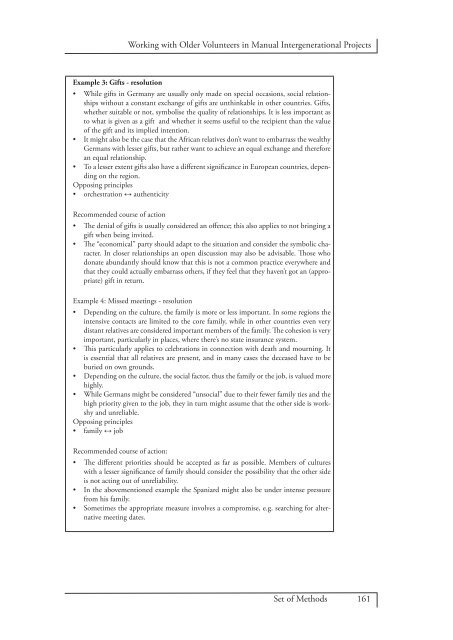Download - TRAMP - Arbeit und Leben DGB/VHS
Download - TRAMP - Arbeit und Leben DGB/VHS
Download - TRAMP - Arbeit und Leben DGB/VHS
You also want an ePaper? Increase the reach of your titles
YUMPU automatically turns print PDFs into web optimized ePapers that Google loves.
Working with Older Volunteers in Manual Intergenerational Projects<br />
Example 3: Gifts - resolution<br />
• While gifts in Germany are usually only made on special occasions, social relationships<br />
without a constant exchange of gifts are unthinkable in other countries. Gifts,<br />
whether suitable or not, symbolise the quality of relationships. It is less important as<br />
to what is given as a gift and whether it seems useful to the recipient than the value<br />
of the gift and its implied intention.<br />
• It might also be the case that the African relatives don’t want to embarrass the wealthy<br />
Germans with lesser gifts, but rather want to achieve an equal exchange and therefore<br />
an equal relationship.<br />
• To a lesser extent gifts also have a different significance in European countries, depending<br />
on the region.<br />
Opposing principles<br />
• orchestration ↔ authenticity<br />
Recommended course of action<br />
• The denial of gifts is usually considered an offence; this also applies to not bringing a<br />
gift when being invited.<br />
• The “economical” party should adapt to the situation and consider the symbolic character.<br />
In closer relationships an open discussion may also be advisable. Those who<br />
donate ab<strong>und</strong>antly should know that this is not a common practice everywhere and<br />
that they could actually embarrass others, if they feel that they haven’t got an (appropriate)<br />
gift in return.<br />
Example 4: Missed meetings - resolution<br />
• Depending on the culture, the family is more or less important. In some regions the<br />
intensive contacts are limited to the core family, while in other countries even very<br />
distant relatives are considered important members of the family. The cohesion is very<br />
important, particularly in places, where there’s no state insurance system.<br />
• This particularly applies to celebrations in connection with death and mourning. It<br />
is essential that all relatives are present, and in many cases the deceased have to be<br />
buried on own gro<strong>und</strong>s.<br />
• Depending on the culture, the social factor, thus the family or the job, is valued more<br />
highly.<br />
• While Germans might be considered “unsocial” due to their fewer family ties and the<br />
high priority given to the job, they in turn might assume that the other side is workshy<br />
and unreliable.<br />
Opposing principles<br />
• family ↔ job<br />
Recommended course of action:<br />
• The different priorities should be accepted as far as possible. Members of cultures<br />
with a lesser significance of family should consider the possibility that the other side<br />
is not acting out of unreliability.<br />
• In the abovementioned example the Spaniard might also be <strong>und</strong>er intense pressure<br />
from his family.<br />
• Sometimes the appropriate measure involves a compromise, e.g. searching for alternative<br />
meeting dates.<br />
Set of Methods 161


